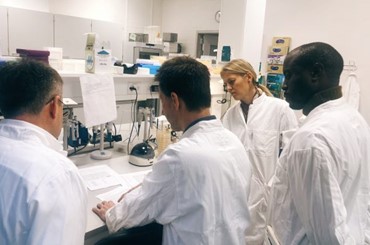
International Vaccine Institute

The RADAAR consortium is led by the International Vaccine Institute (IVI). IVI, based in Seoul, Republic of Korea, develops and introduces new and improved vaccines to protect the world’s poorest people, especially children, in developing countries. IVI operates as an independent international organization under a treaty signed by 35 countries and the World Health Organization (WHO). IVI conducts research in more than 30 countries throughout Asia, Africa and Latin America on epidemiological and disease surveillance, and clinical studies of vaccines against enteric and diarrhoeal infections, Japanese encephalitis, MERS-CoV, and dengue fever, and develops new and improved vaccines. IVI is the lead grantee for the RADAAR consortium. The three RADAAR consortium partners are:
Public Health Surveillance Group

The Public Health Surveillance Group (PHSG) is a global health consulting group based in the United States. PHSG provides services and support to initiatives in public health surveillance, global health security, research, and monitoring & evaluation. PHSG strives to improve health systems and generate high-quality data to equip decision-makers with the information necessary to reduce morbidity and mortality. PHSG collaborates with leading public health organisations and local governments in over 20 countries in Africa and Asia to enhance vertical and integrated surveillance strategies and systems. PHSG, led by Dr. William MacWright, are also part of the consortium for the IVI-led CAPTURA project, providing support for in-country activities, and expertise in the development of protocols, training modules and monitoring. (see https://captura.ivi.int/), also supported by The Fleming Fund (https://www.flemingfund.org/grants/1-4-collection-of-historical-amr-data-sea/).
WHONET

The WHONET microbiology database software is already actively used in most CAPTURA countries, capturing and standardising data from diverse laboratory information systems into a common platform, facilitating integrated management, analysis, and interpretation of microbiological findings. John Stelling and the rest of the WHONET development team at Brigham & Women’s Hospital will be supporting data collection and collation from sites that use WHONET and support the in-country capacity building.
BIG DATA INSTITUTE

Prof. David Aanensen and the team from the Big Data Institute, University of Oxford have developed global methods for epidemiological data linkage (https://microreact.org) to enable the analyses and visualisation of very large datasets. Their expertise will guide the collection and analysis of datasets (including genomic data), interpretation, visualisation, and delivery tools.
FLEMING FUND

The Fleming Fund is a £265 million UK aid investment to tackle antimicrobial resistance in low- and middle-income countries around the world. The programme is managed by the UK Department of Health and Social Care, in partnership with Mott MacDonald, the Fleming Fund Grant Management Agent.
THE FLEMING FUND REGIONAL GRANTS:
IVI PROJECTS
The UK Government established The Fleming Fund to respond to the global threat of AMR. The Fleming Fund Regional Grants include a “call for data,” which aims to expand the volume of historical and current data available on AMR and antimicrobial use (AMU) across regions in Africa and Asia. The Regional Grants programme runs in parallel with the Country Grants and Fellowship Scheme grants across the four Fleming Fund regions: west, east and southern Africa, and south and south-east Asia. The purpose is to collect historical AMR data and boost the impact of the Country and Fellowship grants through regional initiatives. There are 12 regional grants, each with a different focus, e.g., improving data protocols, strengthening political AMR advocacy, improving regional AMR training and networks. IVI is involved in three regional grants: the RADAAR project, and the following:
Collection of Historical AMR Data (CAPTURA Project)
IVI is the lead grantee for the CAPTURA consortium – with the same partners as RADAAR – and in charge of the overall work including organising stakeholder meetings and in-country and regional training and workshops. CAPTURA started in 2019 and is focused on human health, in south and south-east Asia. It was established to collect and analyse retrospective AMR/AMU data; improve local capacity to collect and use data at the national, regional, and global level; identify gaps in data from regions; and improve awareness of AMR policy to address AMR at country and regional level. Countries involved are: Laos PDR, Myanmar, Pakistan, Papua New Guinea, Timor-Leste, and Viet Nam (see https://captura.ivi.int/ and https://www.flemingfund.org/grants/1-4-collection-of-historical-amr-data-sea/)
Improving the Quality of Bacteriology Diagnostics for AMR (EQ-ASIA)
IVI is a consortium partner, with the Technical University Denmark as the lead grantee for the EQ-ASIA project, based on lab proficiency and quality assurance. The project objectives are: to map coverage, availability and uptake of external quality assurance (EQA) programmes across One Health sectors, and to strengthen the provision of EQA services to National Reference Laboratories/centres of excellence across One Health sectors. Countries involved are: Bangladesh, Bhutan, India, Indonesia, Nepal, Sri Lanka, Myanmar, Laos PDR, Pakistan, Timor-Leste, Pakistan, and Papua New Guinea (see https://www.flemingfund.org/grants/2-2-improving-the-quality-of-bacteriology-diagnostics-for-amr-asia/

Lab training during the EQASIA kick-off meeting in Kgs. Lyngby, Denmark with the IVI and DTU teams.
Credit: National Food Institute
For further information on The Fleming Fund Regional Grants:
Request for Proposal for Regional Grants Round 2 (PDF):
https://www.flemingfund.org/wp-content/uploads/e831b99e501aed4eedf1e9c1d06c8c39.pdf
Measuring Progress
https://www.flemingfund.org/our-approach/measuring-progress/

